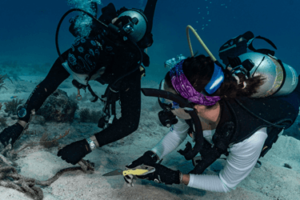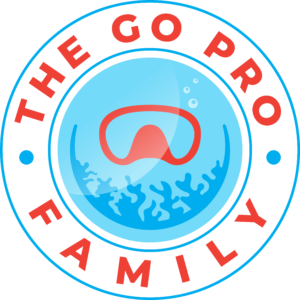Are you a new PADI Instructor looking for your first job? Or an experienced dive-pro planning to relocate to another beautiful diving destination? Preparing a diving resume can be something that a lot of people get stuck with.
My IDC candidates often ask me for tips or suggestions on preparing a good CV, so I thought I would put together a list of things that every scuba instructor should remember when preparing their resume. Actually, I don’t think there is such a thing as a “perfect CV” but I hope that these guidelines will help to inspire you and help get your job application on the “interview” pile instead of the “trash” pile.
Look at your CV as your advertisement or audition.
A television advert is short, grabs your attention immediately, and tells you why it’s product is better than the others on the market. That’s what your CV needs to do. You won’t be the only person applying for the job so you need to stand out from the crowd.
Tweak your CV for each job.
Don’t just have a generic CV that you send off to everyone. Make it relevant to each job. For example, if you’re applying for a job on a remote island, make sure you point out that you have enjoyed living or have worked in such places before. Alternatively, you can include this personalized information in a covering email. Either way, make it clear that you have done a bit of research on your potential place of work and tell them why you would be the right person for the job.
 Include a short “profile”.
Include a short “profile”.
A brief personal statement to introduce your product (that’s you!), what are your unique points and how you will succeed at this job. Be confident without lying, and make sure it is brief. They don’t want to read your life story.
Give examples to prove your skills.
If your CV says you have “good communication skills” or you “work well in a team”, then the dive shop owner will have read this hundreds of times before! Instead, try to back these generic statements up with examples from your work history or word them in another way to show that you understand what these skills require. For example, “Strong ability to communicate clearly and effectively” or “Work positively to strive for the success of my team“.
Keep it brief.
Your CV should be no more than 2 A4 pages. You shouldn’t use long sentences to get across what you want to say, but use bullet points and short, direct sentences beginning with the important word. For example, instead of saying “Whilst I was working as an instructor at this dive shop I was in charge of organising a small team of Divemasters.” say something like “Organised a small team of Divemasters“. Imagine you are tweeting your CV and have a limited number of characters to get your point across.

State your teaching experience.
If you don’t include a note of how many student certifications you have then the best case is the dive shop will have to write back to you to ask you, the worst case is they won’t bother and will put your CV in the bin. You don’t know how many you have? Then find out! The PADI Pros´ site has this information available to all its members.
What if you have no scuba teaching experience?
It is probably true that your first job as a dive instructor is the hardest job to get as you need to get your proverbial foot in the door to be able to prove yourself as an Instructor. But if you are applying for your first job then you can still show off your teaching experience. Maybe you did some kind of internship after your IDC and team-taught some courses. Even if you weren’t credited with the certification you should still include this experience. Or maybe you can focus on your teaching/supervisory role you had as a Divemaster. If you conducted many refreshers, did the DSD Leader Internship, or regularly assisted courses as a certified assistant, then all this counts.
What about non-diving work history?
If you already have plenty of experience working as an instructor then focus on that in your CV. But if you are applying for your first scuba instructor job consider what skills and attributes you bring from your non-diving work history which will transfer well to your role as dive instructor. Experience in sales and customer service are always sought after, or perhaps you were an instructor of something else like skiing? Again, keep it brief. If you speak other languages (ie you can at minimum give a dive briefing in that language) then make sure you put that information in a prominent place.
Photo or no photo?
This is a tricky one. In many countries employment laws don’t allow photographs, so my recommendation is only send one if requested to do so. Any photo should be a professional head-and-shoulders photo, not semi-naked holiday pics. Also, make sure the photo and CV together are no bigger than 1MB. When I was working in the Philippines with a poor internet connection someone once sent me a 15MB resume which blocked up my inbox for two days!
Don’t forget your contact information.
Make sure you check and double check your email address, and phone/WhatsApp number. Be careful however about including your Facebook/Instagram details. Only do this if you are 100% sure that your profile info and photos portray the type of person that the dive centre wants to employ and that there are no incriminating photographs on there (yes, they will check!). Many Instructors have two Facebook profiles – one for personal friends and family (and those party photos), and another “Scuba profile” to which they invite their students and post fun, professional photos from their job as a dive instructor.
Language/spelling/grammar.
Generally speaking, your CV should be written in the same language in which the job was advertised. I know that this might mean that you are not writing in your native language but that is no excuse for bad spelling and grammar. Use spell check but then also read and re-read your CV to make sure it makes sense and looks right. Then also pass it to someone else (preferably who is a native speaker) to get them to check it over for you. No, the dive shop is not employing you for your spelling skills but if you can’t be bothered to check carefully the presentation of your job application then the reader will assume that you are likely to have the same laid-back attitude to your work.
The CV is the first step.
Hopefully if you follow these simple guidelines your CV will stand out for all the right reasons. But a brilliant resume is still just a piece of paper which, with a bit of luck, will get you an interview or better still, a job! The rest is down to you to show your new employer that you have the skills, attitude and work ethic that you so eloquently put down in writing.
Good luck!
We offer professional level training including PADI Instructor Development Courses in Playa del Carmen, Mexico, as well as recreational, technical, cave diving and freediving.

Sustainable Dive Travel: The Go Pro Family’s Efforts to Protect the Ocean

From Challenges to Triumphs: How IDC Graduates Made Waves in Their Scuba Careers



